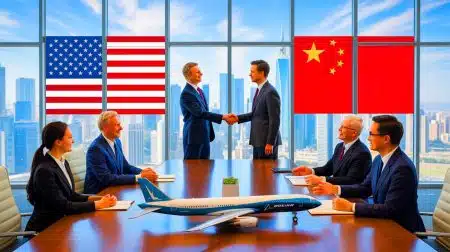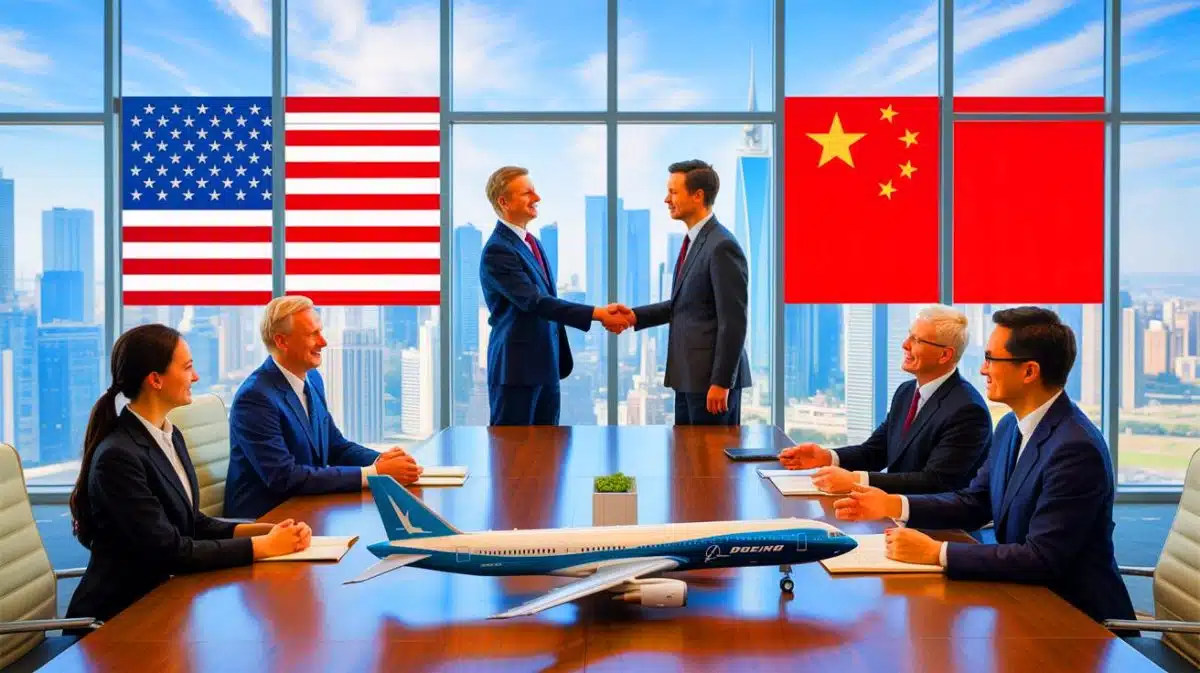| IN A NUTSHELL |
|
The United States and China are on the brink of finalizing a significant aircraft purchase that could reshape their economic relationship. According to U.S. Ambassador to China David Perdue, discussions are nearing completion, hinting at a substantial order from Boeing Co. This move represents a pivotal moment in U.S.-China relations, as both countries strive to improve diplomatic ties and advance a broader trade agreement. Although specific details regarding the order size remain undisclosed, the negotiations are expected to conclude soon, marking a potential resurgence in bilateral cooperation. As the world watches, this development could have lasting impacts on global trade dynamics.
Strengthening Diplomatic Relations
The potential Boeing aircraft order serves as a strategic step in strengthening U.S.-China relations. The diplomatic ties between the two nations have been strained in recent years due to trade disputes, technology competition, and geopolitical tensions. By engaging in high-stakes negotiations, both countries signal a willingness to collaborate and find common ground. This aircraft deal could be a critical component in a broader strategy to address longstanding issues and foster mutual understanding.
Ambassador David Perdue’s presence in Beijing alongside a delegation of U.S. lawmakers underscores the importance of this negotiation. It reflects a concerted effort by the U.S. to engage China at multiple levels, ensuring that diplomatic efforts are comprehensive and effective. The aircraft order could pave the way for future agreements, creating a foundation for ongoing dialogue and cooperation in other areas such as climate change, technology, and global security.
The potential agreement highlights the significance of diplomacy in resolving international disputes and promoting economic stability. By prioritizing dialogue over confrontation, the U.S. and China can work toward a more stable and prosperous future for both nations.
Economic Implications of the Deal
The anticipated Boeing order carries substantial economic implications for both the United States and China. For Boeing, a major contract with China represents a significant boost in revenue and market share. As one of the world’s largest aerospace manufacturers, securing a deal of this magnitude can help stabilize Boeing’s financial outlook and reinforce its position in the global aircraft market.
For China, acquiring new aircraft aligns with its ambitions to expand and modernize its commercial aviation sector. The country’s growing middle class and increasing demand for air travel necessitate a robust fleet of modern aircraft. A purchase from Boeing would not only meet these needs but also diversify China’s aviation partnerships, reducing dependency on any single supplier.
Table: Potential Economic Impact
| Aspect | U.S. Impact | China Impact |
|---|---|---|
| Revenue | Increased for Boeing | Enhanced aviation capacity |
| Employment | Job creation in manufacturing | Growth in aviation sector jobs |
This potential deal is also a critical opportunity for both nations to demonstrate economic interdependence and the benefits of collaboration in addressing global market challenges.
The Role of Trade Negotiations
The aircraft deal reflects broader trade negotiations between the U.S. and China aimed at addressing various economic concerns. Trade talks have been a persistent source of tension, with both countries imposing tariffs and countermeasures that have affected global markets. Successfully concluding this aircraft order could signal a thaw in these tensions and potentially lead to more comprehensive trade agreements.
Ambassador Perdue’s remarks highlight the strategic importance of trade in diplomatic efforts. By focusing on mutually beneficial agreements, the U.S. and China can work towards reducing trade barriers and fostering economic growth. This deal serves as a testament to the potential for trade to act as a bridge in international relations, promoting cooperation over conflict.
The success of these negotiations could encourage both nations to explore further opportunities in other sectors, such as technology, energy, and agriculture, ultimately contributing to a more balanced and equitable global economy.
Future Prospects and Challenges
While the potential Boeing order is a positive development, several challenges remain. Both nations must navigate the complexities of international trade and address underlying issues that have contributed to tension in the past. Intellectual property rights, cybersecurity, and human rights remain contentious areas that require careful negotiation.
The success of this aircraft deal could set a precedent for future collaborations, but it also raises questions about the sustainability of such agreements. Can the U.S. and China maintain a cooperative relationship amid ongoing geopolitical challenges? How will other global players react to this development, and what impact will it have on international trade dynamics?
Both countries must remain vigilant and committed to open communication to ensure that this agreement serves as a foundation for lasting peace and prosperity.
The impending Boeing aircraft order between the U.S. and China marks a significant milestone in their bilateral relations. As both countries finalize negotiations, the world watches with anticipation. The outcome of this deal could influence future trade agreements and impact global economic dynamics. However, the path forward is not without challenges. Can the U.S. and China leverage this agreement to address deeper issues and foster sustained cooperation? The answer lies in their ability to navigate a complex landscape of diplomacy and trade.
Did you like it? 4.3/5 (23)









Wow, what a surprise! Could this mean the end of the trade war? 🤔
Wow, did anyone see this coming? 😲
Seems like Boeing got a huge win here! How will this affect their stock prices?
Finally some good news in the realm of international trade!
I wonder how this will impact the job market in the U.S. 🏭✈️